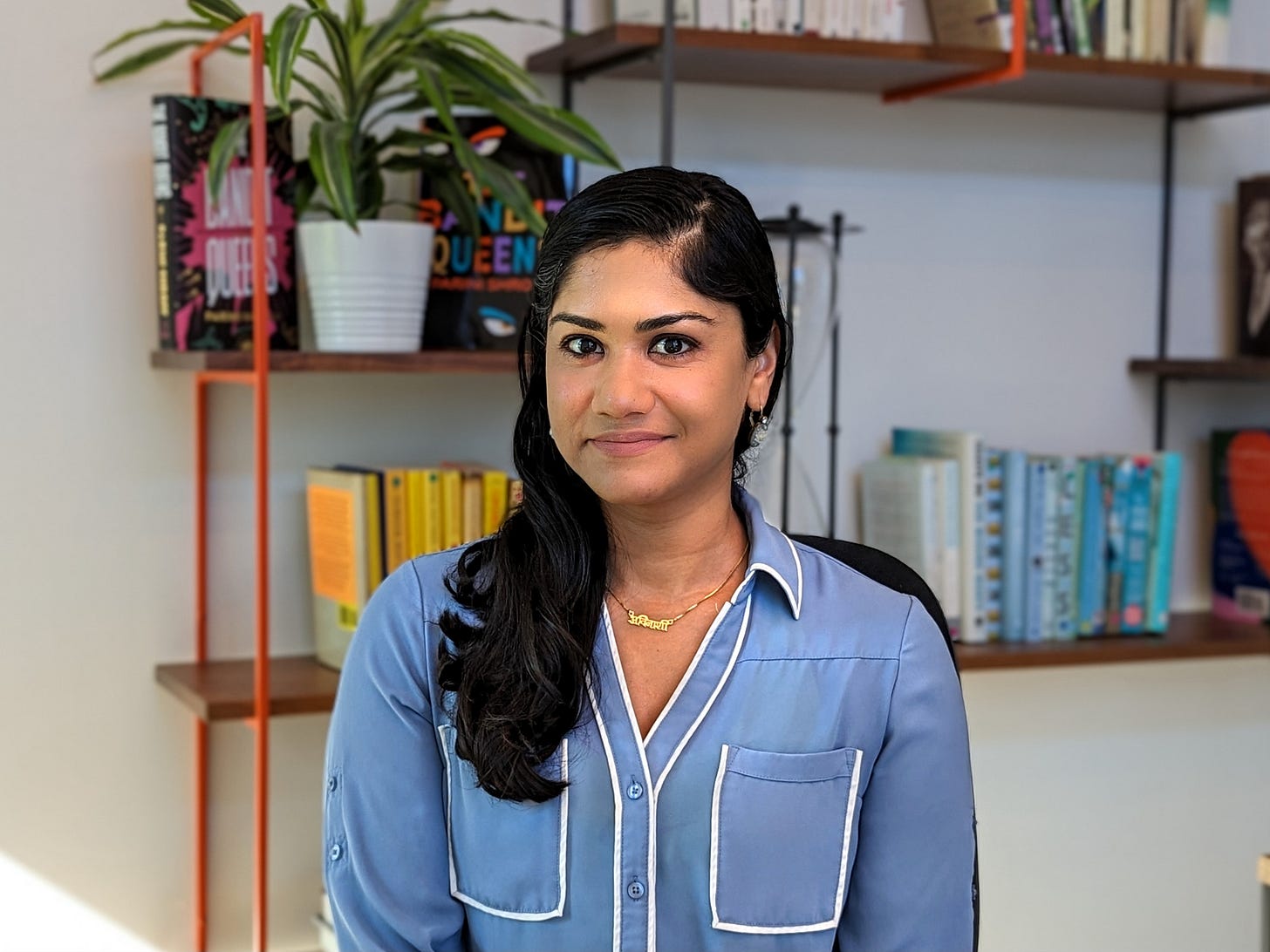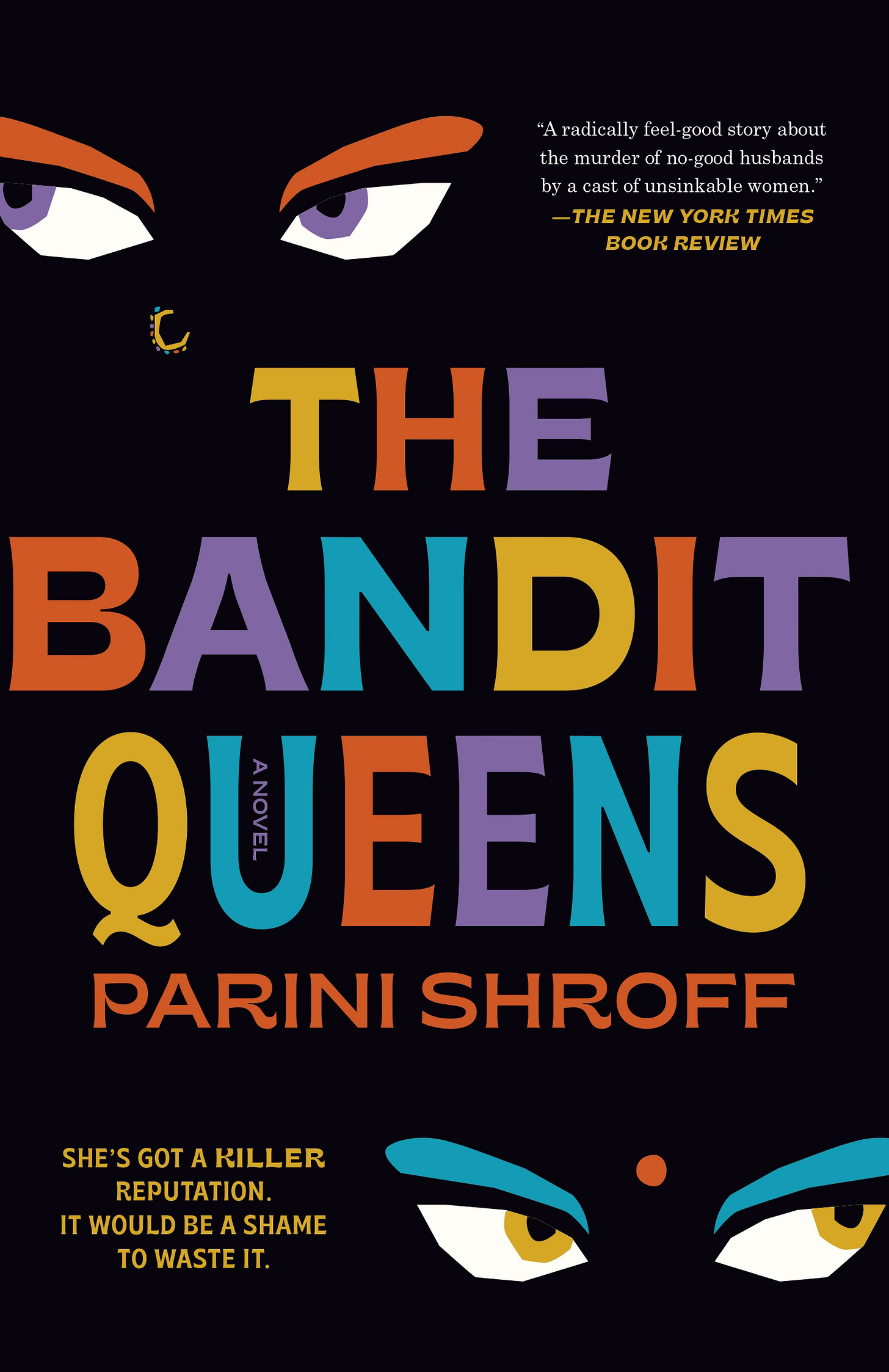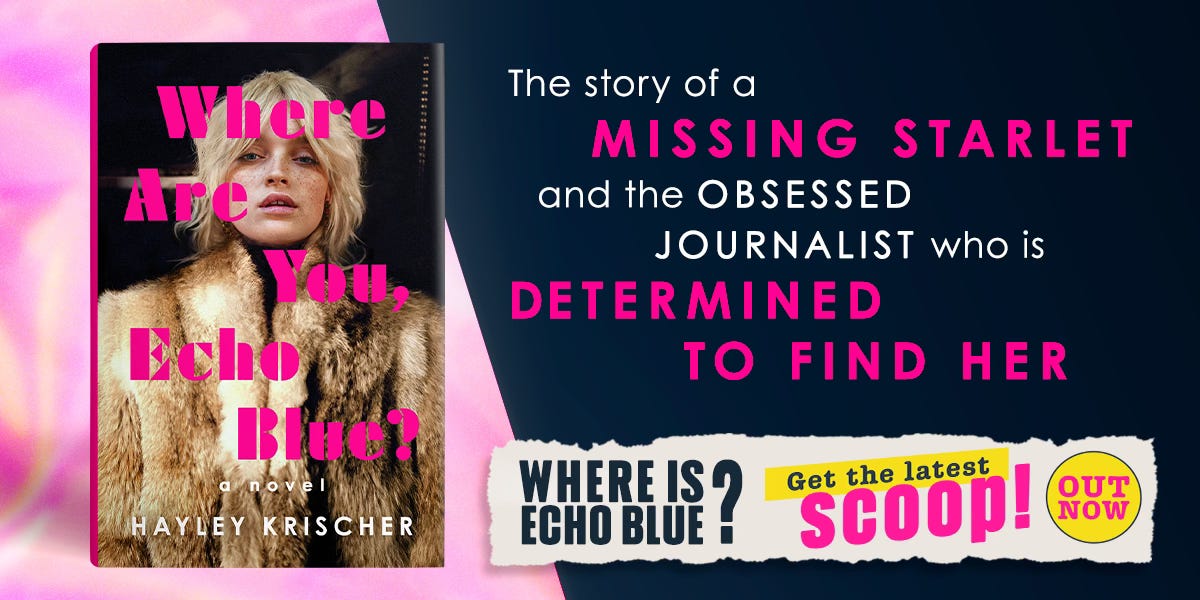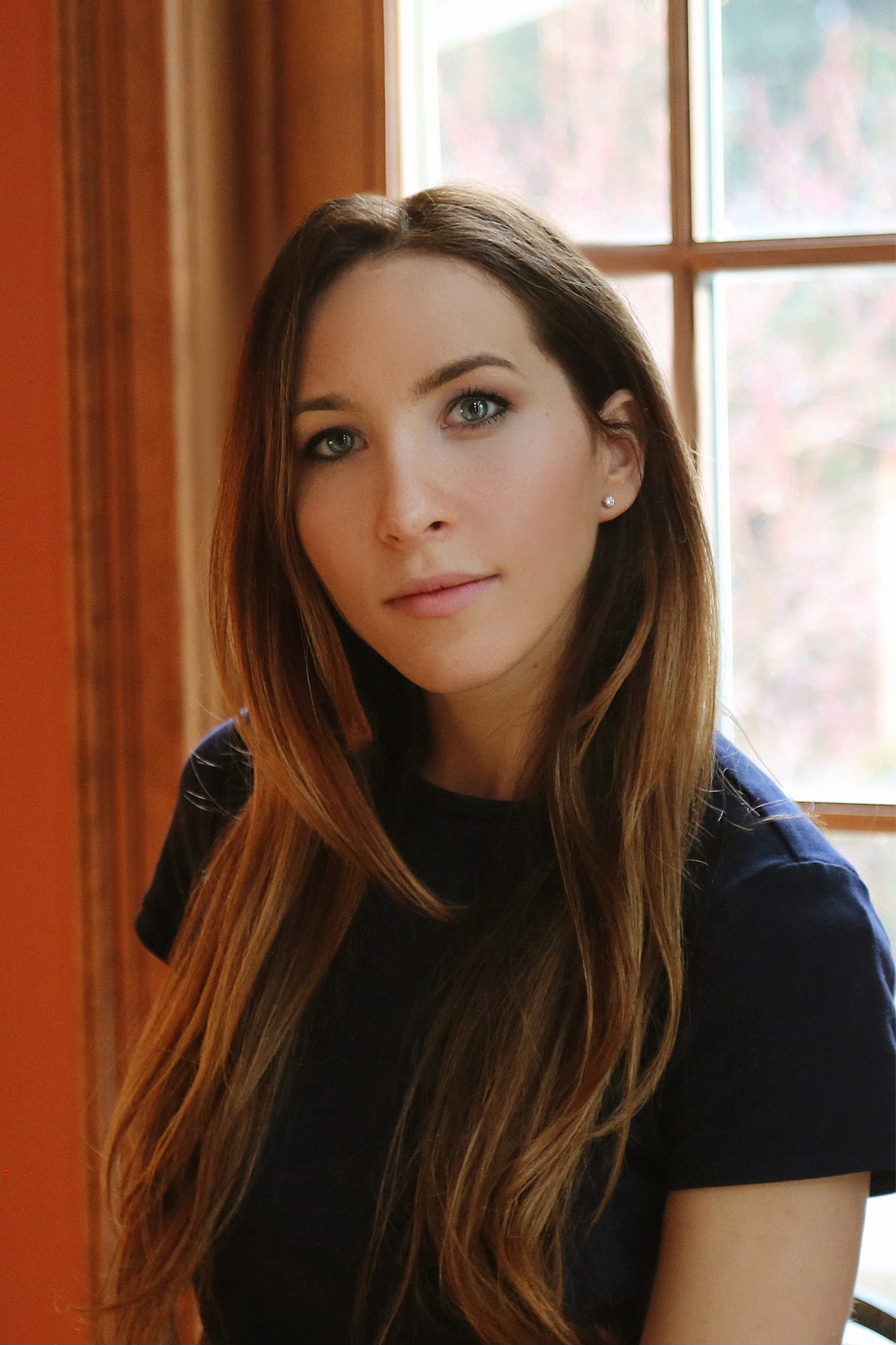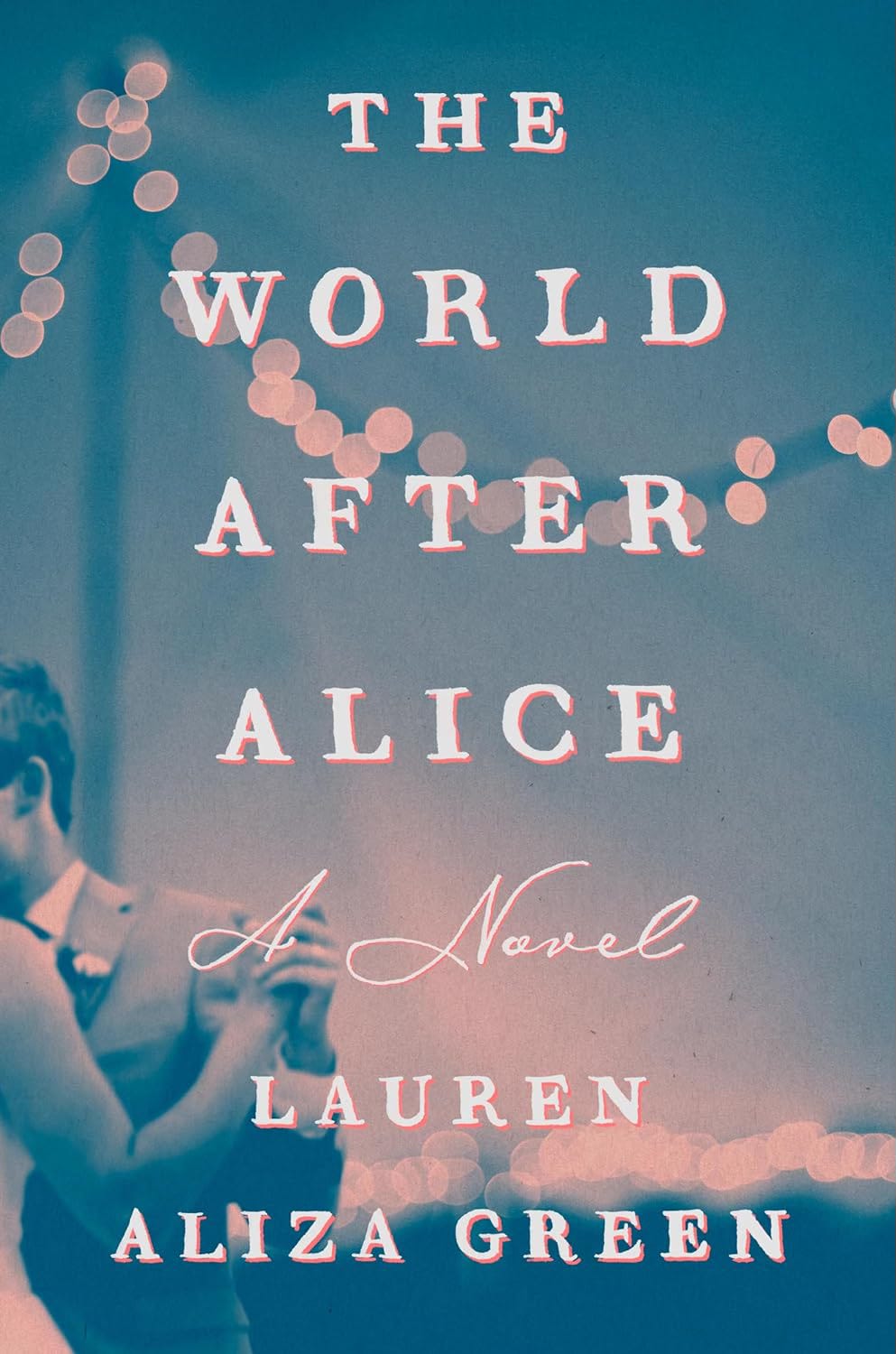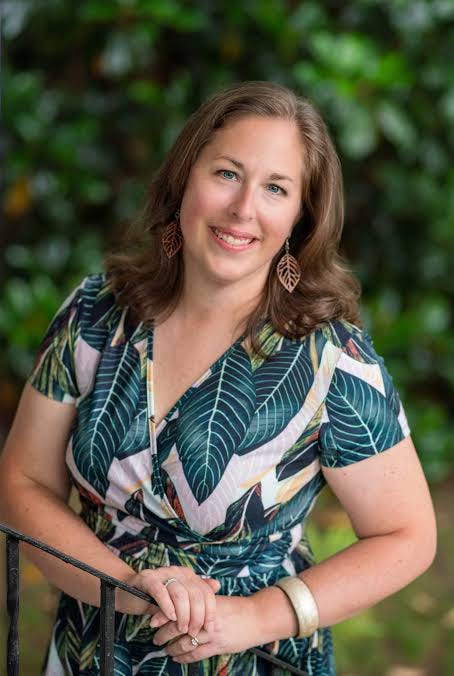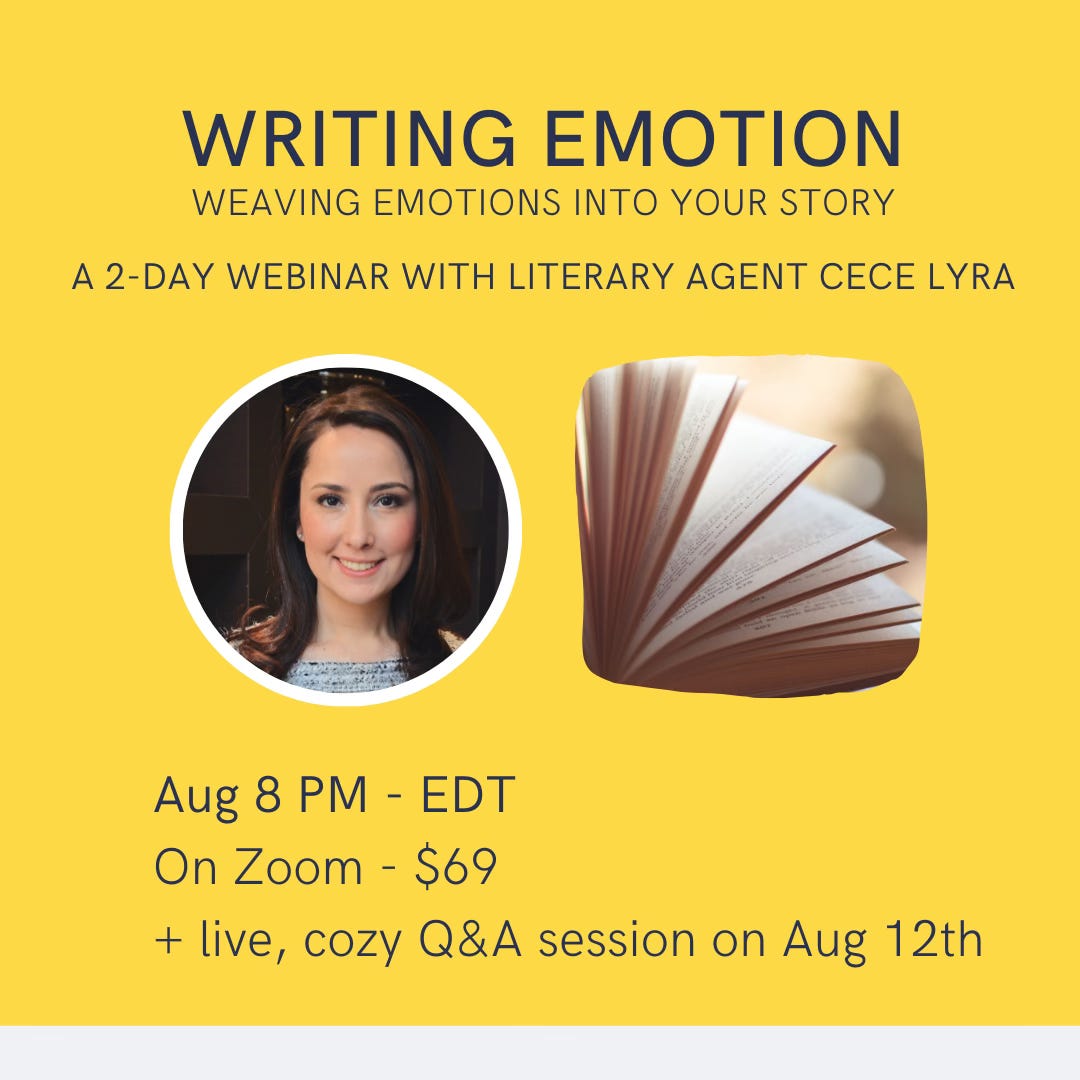Parini Shroff on Giving Yourself Permission to Grow as a Writer
Plus, Hayley Krischer shares her favourite piece of writing advice, The Query Lab is back, and Lauren Aliza Green asks: "What if your darlings don't have to die?"
Happy Friday, writing friends!
It’s a good thing it’s the weekend, because we’ve got a lot to share with you today!
This week on the podcast, CeCe (accompanied by her inner fangirl 🤩) interviews Parini Shroff, author of the bestselling The Bandit Queens (a book so good CeCe owns it in three different formats!). Parini shares her daily writing process and CeCe answers the question we hear so often from our listeners, who are always asking us, “How can I break the rules?” CeCe’s answer? “Reading The Bandit Queens will show you how.” Also on the podcast is another backlist episode of 📕Books with Hooks🪝for you to enjoy while our hosts take a well-deserved break.
We’ve also got a Q&A with author Hayley Krischer (whose Where Are You, Echo Blue? is out now). Hayley shares a great piece of writing advice that we should all try to take on board (although she herself acknowledges it isn’t easy), and also offers some hope to anyone who thinks their ms has hit a wall and just won’t sell (read on to see just how long it took Hayley to sell her YA debut).
Speaking of writing advice…You’ve no doubt all heard what has to be the most famous writing advice of all, “Kill your darlings.” This week, Lauren Aliza Green (whose debut novel, The World After Alice is out now) shares an essay in which she poses the question, "What if your darlings don't have to die?" You’ll have to read the essay to find out the answer, but it’s definitely giving us a new—and liberating—lens on the revision process. (Editor’s Note: There’s a very real possibility you’ll be stuck with an unbudgeable earworm once you get to the essay’s end. You have been warned. 😉)
The Query Lab is also back, this week featuring the successful query author Meagan Church wrote that led to the publication of her historical fiction novel, The Last Carolina Girl.
And that’s all for now. Thanks for reading! ❤️
The Shit No One Tells You About Writing Team
P.S. Still not sure about upgrading to paid? Check out our Tuesday Teaser below to see what you’re missing!
This Week’s Podcast✨🎙️✨
This week on the podcast (listen to it here!) we’re throwing it back to an early backlist segment of 📕Books with Hooks🪝, after which, CeCe interviews Parini Shroff, lawyer and author of the national bestseller and award nominated The Bandit Queens. They discuss
Parini's experience working as a lawyer part-time while also writing fiction
Finding it difficult to sustain writing for long periods
Parini's editing and writing process
Giving yourself permission to change and grow as a writer
What Parini finds the most challenging in her writing
The POV of The Bandit Queens
Parini's path to publication
How she approaches starting a novel
Her relationship to dark humour
What surprised Parini about becoming a published author; and
What her next book is about.
“I do absolutely struggle with portions of my writing. I'm terrible at endings. The Bandit Queens, the last two chapters took me as long as the rest of the novel to write. I think I wrote it during 2020 during the pandemic. So I think it took me, you know, seven to eight months to write the Bandit Queens and then another half year to write the last two chapters. I have 16 to 20 iterations of the last two chapters alone. And that was really...Frustrating, there was not a lot of joy at that time.”
– Parini
Parini Shroff received her MFA from the University of Texas at Austin. She is a practicing attorney and currently lives in the Bay Area. The Bandit Queens is her debut novel and is a national bestseller. It was also longlisted for the Women's Prize in Fiction, as well as an Andrew Carnegie Medal for Excellence in Fiction.
You can purchase The Bandit Queens on our Bookshop.org affiliate page here. Buying books through this link supports a local indie bookstore, as well as The Shit No One Tells You About Writing 📚❤️
Author Q&A: Hayley Krischer
Hayley Krischer is the author of WHERE ARE YOU, ECHO BLUE? (Dutton July 16, 2024) and the YA novels SOMETHING HAPPENED TO ALI GREENLEAF and THE FALLING GIRLS (Penguin Teen).
Hayley is an award-winning journalist who has written for The New York Times, The New York Times Magazine, The Atlantic, Marie Claire, Elle, and more.
TSNOTYAW: Do you have a go-to mantra or pep talk for the days when writing feels hard?
Hayley Krischer: I try to tell myself to take a walk, see a movie or just get out of the house and hang out with a friend. Writing can be so isolating. As much as of an introvert I am, it's tough to be by yourself for such a long time. It's not my nature to want to leave my house. That's my mantra: Leave the house.
Were you ever close to giving up on writing and, if so, what stopped you?
Yes! Many times. Before I sold my first YA, Something Happened to Ali Greenleaf, which was about a girl who was sexually assaulted by the most popular guy in school. I had written that book for over 20 years. It started as a short story in college and it was a story I couldn't let go of. I just kept adding to it. My agent submitted it to countless places in 2015 I did so many revisions. It just wasn't working. I thought my career as an author was over. So I pivoted, I concentrated on my journalistic career. I was writing a lot for the New York Times. I kept revising the book. Then in 2018, Brett Kavanaugh's trial changed everything. I realized he reminded me so much of the attacker in my book. A light bulb went off. Maybe people were ready for this. My agent had the same thought. She sold the book 4 days later. The moral of the story: don't give up.
What would you say you’ve done right to build a strong and supportive writing network?
I've met some amazing people online who have become real supporters of my work. I feel so lucky that I've met some of these authors. It makes the writing life a lot less lonely. I would say that is definitely and upside of social media. I also have a book club of incredibly intelligent women who have been supportive. Talking about books with them has made me look at my own writing. Plus, my family and my friends have always been supportive. I'm very lucky.
What one piece of advice (craft- or publishing industry-related) has always resonated with you?
A long time ago, maybe I was in a writing class at NYU. A professor, her name was Agnes Rossi, told me that you can't worry about what anyone thinks when you're writing. I didn't believe her back then. I always felt like I needed to make excuses about my characters. Make sure people know they weren't me. I care less about what people think as I've gotten older. There are two dad characters in "Echo Blue" and they're super problematic. Is it MY dad? No. Are they a little bit like my dad? Maybe? Will my dad be hurt reading about these shitty dads? Will he see himself in them? I hope not. I hope he knows that I'm creating a fictional world. Being in a relationship with a writer, being adjacent to a writer and being a family member of a writer is hard. Sometimes people I love see themselves in my work. Everything is fictionalized, but I do write from my life. The less I think about what others will think, the better my writing has gotten.
How do you ensure you have enough time to write amidst so many obligations competing for your time?
It's really hard. The only way to guarantee I get work done is to leave the house. Again, my mantra! Working at the library or at a cafe has been a great exercise for me. I also keep a notebook with an ongoing to do list. I add reminders in my calendar on my phone. I set alarms. Use whatever tools you have!
What is the most challenging part of being a successful author? And how do you mitigate its effects?
First, thank you for calling me a successful author. I don't entirely relate to that statement. But thank you. The most challenging part is finding the balance of pleasing people around me and pleasing myself. There are times my family just has to understand privacy, no matter what they need from me. I sometimes feel like Jack Nicholson in that scene in The Shining where he yells at Wendy, "Every time you walk in here, you're interrupting my process!" I don't want to be a monster. But I do need privacy. I have an office in my house, but it's still noisy. I shut the door to my office and everyone seems to know that means not to interrupt. But I have three animals (two cats and a dog) and they don't care about the closed door.
How did you get your literary agent? What was the querying process like for you?
Emily Sylvan Kim, my agent who I am indebted to, was introduced to me by a friend. She had a small agency 10 years ago when I met her. She was very enthusiastic with my submission and just got me right away. I also submitted to a very big agent, also recommended by friend. That big agent also offered me representation, but I went with my gut and decided on Emily. I don't know how my life would have been different if I went with the other agent. But Emily has turned into my biggest cheerleader, my confidant, and someone I brainstorm all of my ideas with. That's the kind of agent you want in your corner. Fighting for you every step of the way.
What is something you’ve learned about yourself later in your writing career that would have surprised your younger self?
How daring I've become, and how much more daring I want to be. I started out writing "Where Are You, Echo Blue?" knowing that I wanted to write about a woman who descended into madness. In fact, there was a scene in the end where one of the characters ends up locked up in a basement, but my editor and I decided that it didn't suit the story. Leading up to writing this book I read a lot of novels about women falling into psychological madness: "The Perfect Nanny" by Leïla Slimani, "Bunny" by Mona Awad, "Looker" by Laura Sims, "Eileen" by Ottessah Moshfegh, "The Pisces" by Melissa Broder, "Girl in Pieces" by Kathleen Glasgow. I loved all of those books so much and I was compelled to write a character with such abandon like that. I don't think I would have written a character, or been able to write a character so purposefully like that when I was younger. When I was younger, my writing was more of a regurgitation. I felt something. It came out. Now it feels more structured and inspired.
You can purchase Where Are You, Echo Blue? on our Bookshop.org affiliate page here. Buying books through this link supports a local indie bookstore, as well as The Shit No One Tells You About Writing 📚❤️
What if Your Darlings Don’t Have to Die?: On Embracing Revision
by Lauren Aliza Green
Lauren Aliza Green is a novelist, poet, and musician. Her debut novel, The World After Alice, is out now from Viking (US) and Penguin Michael Joseph (UK). Her chapbook, A Great Dark House, won the Poetry Society of America's Chapbook Fellowship. Her writing has appeared in Lit Hub, Threepenny Review, Glimmer Train, American Short Fiction, and elsewhere. Other recognitions include the Eavan Boland Award, sponsored by Poetry Ireland and Stanford University, and a spot on Forbes' 2024 30 Under 30 list.
Every time I try to explain the plot of my debut novel, The World After Alice, I stumble over the premise: an unexpected wedding brings together an estranged family for the first time in twelve years, causing them to confront old wounds and buried secrets as they chart a path toward the future. Those who know me know that I’m not a big party person. I wasn’t one of those little girls who imagined herself walking down an aisle in a white dress, Prince Charming awaiting her at its end with tears in his eyes. My husband and I eloped, just the two of us, in as spontaneous and low-key a manner as possible.
So, how did I, a notorious introvert and wedding-phobe, end up writing a book about a wedding?
First, let me clarify: The World After Alice isn’t entirely a wedding novel—or, at least, isn’t solely a wedding novel. The book unfolds in the wake of a suicide, exploring the aftermath of grief. In fact, the first draft barely contained a wedding at all. It was broken up into three distinct sections (“A triptych,” I called it) and followed a dysfunctional family over the course of a decade as they wove in and out of one another’s lives.
When I pitched this initial idea to my agent, she hesitated. “It feels a little quiet and sad,” she said. “And I’m not sure about the form.”
Ouch.
Amazingly, I wasn’t deterred. (I’m a stubborn optimist. What others perceive as a death knell, I perceive as invitational chimes.) Reading between her words, I understood that the book needed some unifying event, some frame to hold the story’s elements together. The meager excuse of a dinner party I’d used to justify the characters’ gathering in the second part of the triptych wasn’t cutting it. I envisioned the various family members as if they were characters in Interstellar, drifting slowly away from one another into black space. No, there had to be something more significant to anchor the story. But what?
As I wrestled with the low stakes and overly amorphous motivations of my novel’s dinner party, my siblings were meanwhile busy with family gatherings of their own—my twin sister’s wedding having been postponed by the pandemic and my brother immersed in planning his. I felt for them (there’s a reason I wanted to elope, after all). Is there anything more fraught than a wedding?
Cue the lightbulb.
Back to the drawing board I went, this time with the perfect catalyst. I had to scrap everything I’d written, pare it all away, and figure out how to begin again. Was it terrifying? Absolutely. Was it worth it? I hope so.
For months, I drafted and redrafted, discarding entire books. I salvaged what was good—which often felt like nothing. (There is always something worth salvaging, dear reader, even if only an inspired turn of phrase.) Characters’ ethnicities, genders, and names all changed and changed again. This might sound scary, and I assure you it was. It was also, however, liberating. The delight of writing is that it is not life. We can make decisions, watch them play out, and then change our minds. There are infinite new pathways to travel down.
As writers, we can grow so attached to what’s on the page that the work begins to seem made of stone. It is not, though. It is fluid and breathing. A character death isn’t working on page sixty-five? Great! Let’s try reviving him. The work is not hardened marble but wet clay. It is there to be shaped and reshaped. How freeing. How glorious. What a world to exist in, where the possibilities are endless. The peril comes in closing oneself off to them.
In workshops, we often hear that famous advice, “Kill your darlings.” I prefer my version: Love your darlings enough that you allow them to shift and reveal themselves. Isn’t this what it means, after all, to love something—that you allow it to develop and surprise you? If it is true that the only constant in life (and in the universe—hello, entropy!) is change, then as soon as something is pinned down, inert, we might as well render it dead.
Your work, however, is not dead. The world that exists beyond your words—a world that you yourself have created—is perhaps more alive to you than the real world. As it should be. And if, as that world turns, it doesn’t align perfectly with the outline you’ve devised, that’s OK. Slacken the reins. We’ve chosen to pursue an art form that demands constant renegotiation and fervent reconsideration.
Now onto my favorite revision anecdote, which I read about in the fabulous book Something Wonderful, which chronicles the lives of Richard Rodgers and Oscar Hammerstein. In the original “So Long, Farewell” song, Hammerstein wrote the lyrics as:
So long, farewell
Auf wiedersehen, aloha
I hate to say
The time has come to go-ha.
If that doesn’t convince you to go back to your writing desk, what will? Onward, writers!
You can purchase The World After Alice on our Bookshop.org affiliate page here.
The Query Lab 📝🖊
Welcome to The Query Lab where each Friday until the end of August we’ll be
sharing a successful query letter that got an author their agent AND their book deal.
Today we’ve got a query from Meagan Church, author of The Last Carolina Girl 😍:
Dear [Redacted],
Knowing of your interest in historical fiction, I wish to submit a query to your attention for my novel, THE LAST CAROLINA GIRL.
North Carolina, 1935, and the state’s recently formed eugenics board is mandating forced sterilizations for what is considered “the betterment” of society, THE LAST CAROLINA GIRL is inspired by a true story.
For fourteen-year-old Leah Payne, life in her beloved coastal Carolina town is worlds away from the harsh realities of the day. Devoted to her father and their pilgrimages to the waterways that soothe her soul, she knows only of the familiarity of her small community of neighbors, and the hidden but irrepressible magic of the natural world.
But when an accident takes her father’s life, leaving her an orphan, Leah finds herself cast into a family of strangers whose welcoming façade hides a terrible secret—and where a moment of violence will thrust Leah into the very center of a state’s shameful darkness, forcing her to risk the past she holds dear to protect her future.
Similar in subject matter to Lisa Wingate’s BEFORE WE WERE YOURS and steeped in the lush settings of North Carolina like Delia Owens’ WHERE THE CRAWDADS SING; THE LAST CAROLINA GIRL sheds light on a wrenching era of injustice, and a young woman’s fight for her independence.
I have a degree in English with a focus on creative writing from Indiana University, and work as a freelance writer for brands, blogs and organizations.
The novel is complete at 68,000 words and I would be most pleased to forward a portion or the whole for your review.
My thanks for your time and consideration.
You can learn more about Meagan here ❤️ and can purchase The Last Carolina Girl on our Bookshop.org affiliate page here. 🥰
Click below for the downloadable version of Meagan’s successful query!
Tuesday Teaser 😉
Next week’s newsletter exclusively for our paid members is a juicy one!
We’ve got a Q&A with Juliet Grames, author of the bestselling The Seven or Eight Deaths of Stella Fortuna, who shares her thoughts on surviving rejection and other publishing perils by focussing on what you can control, rather than what you can’t, as well as an essay from Carly Watters, in which she shares her insights on surviving when you’re not rejected (it’s not always a straightforward decision when you get an offer of representation for your ms, and can actually be pretty fraught, but Carly’s got you covered, with insider advice to help you make the right decision for you and your work).
And Lauren Aliza Green returns with more thoughts, this time on the subject of blurbs. You may have noticed that Lauren snagged some serious heavy hitters to blurb her debut (we’re talking the likes of Ann Napolitano, Mary Beth Keane, and Charmaine Wilkerson, to name a few), so we asked her the question we’re sure a lot of you are just as keen to know the answer to, too: How???
To find out what Lauren said and read two brand-new written query letter critiques from Carly and CeCe, sign up to be a paid member today!
For just $8USD a month or $80USD a year you get:
an exclusive newsletter on Tuesdays featuring bonus author Q&As and other exclusive content from industry experts
weekly access to Carly Watters and CeCe Lyra’s written notes on queries from the podcast’s Books With Hooks feature
monthly bonus podcast episodes, AND
regular Ask Me Anythings / Q&As with Carly, CeCe, and Bianca Marais.
If that doesn’t kickstart your writing journey, we don’t know what will!
It’s Time to Get Emotional with CeCe
What do all great stories have in common? They make us feel. Which is why the ability to weave emotion into a story is so important. Indeed, no matter the genre, being able to effectively convey a range of emotion will draw your readers in from the very start and compel them to read on.
The 3+ hour class covers various aspects of weaving emotions into your story, including:
Active vs. passive emotions;
How to effectively convey emotion (showing vs. telling);
Most common mistakes in writing emotion (and how to get it right);
Common challenges in writing emotions (and how to turn them into successes);
How to include emotion in your outline and synopsis;
Tips and tricks to effectively convey emotion;
The role of emotion in the query letter; and
The importance of emotional context the first 10 pages (or: How soon should I introduce emotion?).
PLUS we'll have a live, cozy Q&A session on Monday, August 12th at 8pm ET in which attendees will be able to turn on their camera (optional) and ask questions to CeCe.
If you cannot attend the live Q&A session, you are welcome to submit your questions during webinar on August 8th.
Writers of all categories and genres are invited to attend.
If you cannot attend live but wish to watch the webinar, please sign up as the recording will be emailed to you 24hr later. Recordings will be available to the viewer for one month.
Be Part of Carly’s Masterclass 😍📝
Carly’s class includes 10+ hours of writing and publishing video lessons you have lifetime access to, monthly Q&A sessions, and fresh content every quarter.
Did we mention there’s an app, too? You can keep learning on the go. Don’t miss a minute of Carly’s top career advice for aspiring, emerging and published writers. Get the writing career you’ve always dreamed of.
Bianca’s Great Beta Reader Match Up!
Are you looking for beta readers, some of whom might potentially become writing group members down the line?
Are you wanting to be matched up with those writing in a similar genre and/or time zone, so they can critique your work as you critique theirs at the same time?
Your manuscript doesn't have to be complete to sign up for this 3000-word review!
Registrations are open from now until July 31, with the match emails going out on August 1.
For more information and to register, click below!
That’s all for this week’s news! If you enjoyed it, why not share the love? 🥰
Tune in again next week for more invaluable wisdom from our wonderful hosts! Until then, happy writing! 😍
❤️ The Shit No One Tells You About Writing Team
Our work takes place on land now known as Toronto and Ottawa and we acknowledge that these are the traditional territories of the Mississaugas of the Credit, the Anishnabeg, the Chippewa, the Haudenosaunee, and the Wendat Peoples as well as the unceded, unsurrendered territory of the Anishinaabe Algonquin Nation. Toronto is covered under Treaty 13 and the Williams Treaties. We respect and affirm the inherent and Treaty Rights of all Indigenous Peoples across this land and acknowledge the historical oppression of lands, cultures, languages, and the original Peoples in what we now know as Canada. We invite you to learn more about the land you inhabit, the history of that land, and how to actively be part of a better future going forward together at Native Land or Whose Land.
Carly Watters and CeCe Lyra are literary agents at P.S. Literary Agency, but their work in this newsletter is not affiliated with the agency, and the views expressed by Carly and CeCe in this newsletter are solely that of themselves and do not necessarily reflect the views, opinions, policies, or position of P.S. Literary Agency.





